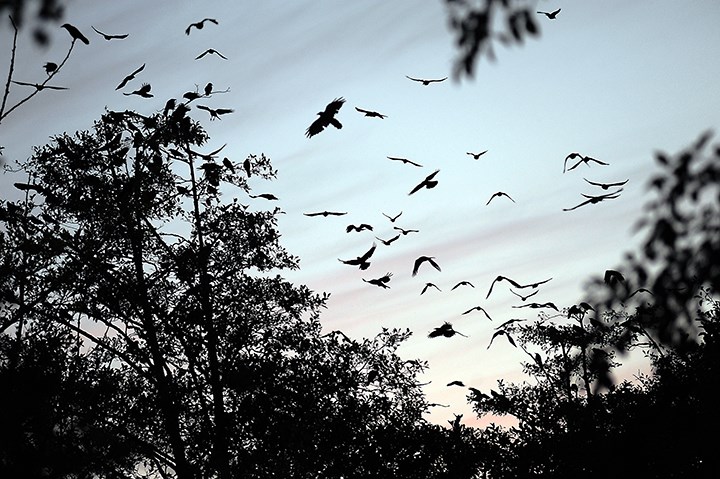Despite its reputation for rooting through garbage along with a thieving lifestyle, the crafty crow clearly didn’t present a problem last year to the City of Vancouver for being appointed the 2014 city bird.
The Northwestern crow may not be as petite, colourful or quiet (woodpecker species not included on that latter note) as the pretty birds that competed for Vancouver’s official bird of 2015, but of all the Bird Week events, this past Friday’s Crow Night was one of the most popular.
The Alice McKay Room at the Vancouver Central Library was packed with crow lovers, most of whom adhered to the dress code of wearing black, including one woman who had attached a homemade beak to her head and wore a cape of wings (incidentally, there were no sightings all week of a human dressed as a black-capped chickadee, the winner of the bird election).
Filmmaker Mike McKinlay introduced his 15-minute Crows documentary rather apologetically with a mention the film is now 10 years old and not high-definition. Nevertheless it is an interesting glimpse into the lives of Vancouver crows from their days at Jericho beach to their raucous Hitchcock-esque evenings at the Burnaby roost near Willingdon Avenue and Highway One.
McKinlay said he didn’t know anything about the bird before beginning his project but wanted to document the creatures because they are part of city life.
“I had a really crappy job and to compensate for this crappy job every night I went out and followed crows,” said McKinlay. “They were so unbelievably aware of the camera. They know you’re there and they will wait until you’re completely set up with your exposure set and your aperture, you’re ready to go — and then they fly away.”
Which is no surprise for crow specialist Dr. Rob Butler who has studied the animal for 20 years to the point he said he started to think like one, joking he was fearful that he might be becoming one. A good amount of his studies were at Mitlenatch Island in the Strait of Georgia where he observed the species’ intelligence, socialness, craftiness, and plunderous nature. An all-in-one example: “Crows recognize their young and recognize their relatives so they don’t steal off them as much as the others,” Butler told the crowd.
He’s even noted that in Japan, rather than dropping a clam and mussel from the air to crack it open, the birds take it to the road for a car to run over.
“Young crows are learning how to do this and we can see how it’s spreading, which means it’s culturally transmitted,” Butler added.
Back home, the Burnaby roost where flocks of crows from Vancouver, the North Shore, Richmond and Coquitlam still congregate to sleep is one that fascinates bird-watchers and scientists alike. The roost is still one of the largest in the province and the birds have overnighted there since the 1970s, even though the size of the treed area has shrunk due to development in recent years. Scientists say the urban roosts are preferable for protection, especially from one of the crow’s greatest enemy — the great horned owl.
While the black-capped chickadee described itself in its Twitter account as being a bird that works hard and plays hard, the fact that more than a half million votes were cast in the bird election — five times as many as in the last municipal election — would’ve no doubt appealed to the crow’s mischievous nature.
The goal of Bird Week is to bring awareness about the importance of birds in Vancouver. Birds, according to the park board, are good indicators of the state of the environment.
rblissett@telus.net
twitter.com/rebeccablissett



